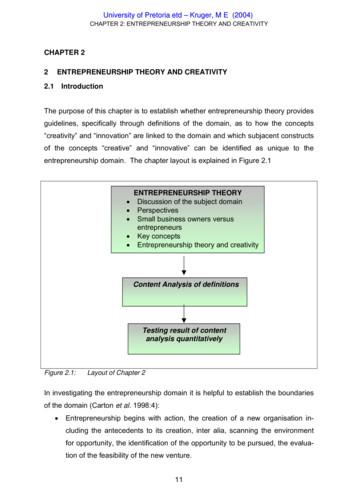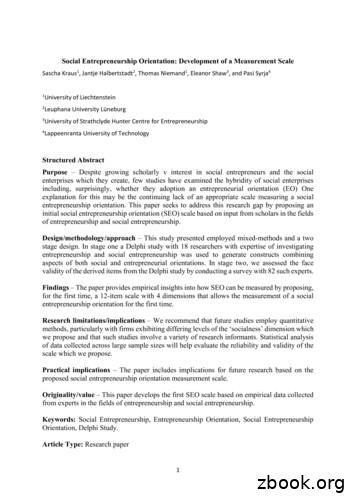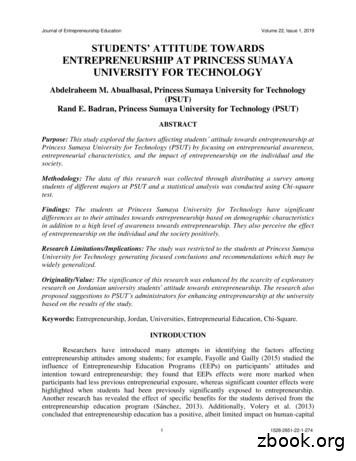Entrepreneurship Education In Nigerian Universities A-PDF Free Download
EDUCATION IN NIGERIAN TERTIARY INSTITUTIONS Ismaila Temitayo Sanusi, University of Eastern Finland Sunday Adewale Olaleye, University of Oulu Päivi Atjonen, University of Eastern Finland ABSTRACT The aim of this research was to assess entrepreneurship education which is a relatively new phenomenon in Nigerian higher education institutions.
To define the entrepreneurship. To explain the significance of Entrepreneurship. To explain the Entrepreneurship Development. To describe the Dynamics of Entrepreneurship Development. 1.1 Need and significance of Entrepreneurship Development in Global contexts It is said that an economy is an effect for which entrepreneurship is the cause.
IN NIGERIAN UNIVERSITIES. EDUCATION . APRIL, 2007 . Benchmark and Minimum Academic Standard - Education Page 2 . first, in the series, was the conduct of Needs Assessment Survey of Labour Market for Nigerian graduates. This was carried out for all the disciplines taught in Nigerian universities. The
Global Entrepreneurship Education II- FRAMEWORK TABLE 1: CASES BY LEARNER CATEGORY III- ENTREPRENEURSHIP EDUCATION IN CHINA The Maker Space of Tsinghua University High School: Extreme Learning Process (XLP) For Entrepreneurship Education Tsinghua x-lab: a University-based Platform For Creativity, Innovation and Entrepreneurship Education
Stock market returns, measured by Nigerian Stock Exchange All Share Index (NSE ASI), dipped by 8.8% as at H1 2020 year-to-date from 26,842.07 in December 2019 to close at 24,479.22 in June 2020. Nigerian Capital Market Update –September 2020 Nigerian capital market update - Septe
13. Nigerian companies. 14. Companies engaged in shipping or air transport. 15. Cable undertakings. 16. Insurance companies. 17. Authorised unit trust scheme. 18. Profits of a company from certain dividends. 19. Payment of dividend by a Nigerian company. 20. Nigerian dividends received by companies other than Nigerian companies. 21.
Nigerian Legal System in resolving disputes as and when necessary. To make an attempt to create national legal norms that regulates and stipulates rights and duties of the citizenry, etc. These broad aims will be achieved by: i. Introducing you to Nigerian Legal System, and the basic principles and sources of Nigerian Legal System. ii.
to universities’s role in the implementation of entrepreneurship education. University needs to apply a concrete entrepreneurship learning pattern based on empirical input to equip college-students with meaningful knowledge in order to encourage college-students’ spirit in entrepreneurship (Suharti & Sirine, 2011).
The research reviewed persistent gender-inequality in Nigerian education at all levels, including the effect in turn-out of the Nigerian Youth Service Corps. The introduction of the free Universal Primary Education (UPE) in the nation in 1976 and the current Universal Basic Education (UBE) since 2000 did not revert the situation.
entrepreneurship education in order to teach to their students through experimental methods (Gustafsson-Pesonen & Remes, 2012). In this sense, it can be said that the studies conducted regarding entrepreneurship education in teacher training are very important in informing teachers and educators about entrepreneurship education.
For example, Nigerian Institute of Personnel Management, Global Journal of Business Disciplines Volume 1, Number 2, 2017 58. NIPM, (cited in Anho, 2011) noted that the quality of graduates from Nigerian Universities is declining rapidly. Anho also cited the report of National Employers Consultative Association
H1: Attitude has an impact on green entrepreneurship intentions. 2.2. Educational Supports Towards Green Entrepreneurship Intention Perceived educational support Entrepreneurship education was pioneered by universities in the United States of America. New studies have shown that green startup intentions (Green Business) are now being strongly
Research-intensive universities need to pro-actively develop the entrepreneurial skills and attitudes of their students and staff. 2. Interdisciplinary student work and project-based learning are essential components of successful entrepreneurship education. 3. For entrepreneurship to thrive at universities and to make it accessible and relevant
The legacy of entrepreneurship education at the University of Oulu is fairly new with the first entrepreneurship education program implemented in 2017. Entrepreneurship education minor is a study program offered by the Oulu Business School (a faculty of the University of Oulu) that consists of six elective courses that students from all
CHAPTER 2: ENTREPRENEURSHIP THEORY AND CREATIVITY ctives. epreneurs. reneurship. 3:49). thought on the meaning of entrepreneurship. One group focused on the characteris-tics of entrepreneurship (e.g. innovation, growth, uniqueness) while a second group focused on the outcomes of entrepreneurship (e.g. the creation of value).
identify and describe characterizations of technology entrepreneurship, digital techno-logy entrepreneurship, and digital entrepreneurship. With this new delineation of terms, we would like to foster discussion between researchers, entrepreneurs, and policy makers on the impact of digitization on entrepreneurship, and set a future research agenda.
Digital entrepreneurship is the phenomenon associated with digital entrepreneurial activity. While the expressions ‘ICT entrepreneurship’ and ‘digital entrepreneurship’ are widely used, we have opted to use only the expression ‘digital entrepreneurship’ in this
Academic entrepreneurship: time for a rethink? 9 As academic entrepreneurship has evolved, so too must scholarly analysis of academic entrepreneurship. There has been a rise in scholarly interest in academic entrepreneurship in the social sciences (e.g., economics, sociology, psychology, and political science) and several fields of business
Entrepreneurship Development and Management, Vasant Desai, HPH 2. Entrepreneurship Management, Bholanath Dutta, Excel Books 3. Entrepreneurial Development, Sangeeta Sharma, PHI 4. Entrepreneurship, Rajeev Roy, Oxford University Press. CONTENTS MODULE I – ENTREPRENEURSHIP 1. The Concept
To define corporate entrepreneurship, initially the term entrepreneurship must be defined. Secondly, it is important to define clearly what entrepreneurship in established companies means. The main problem with the preparation of scientific papers regarding entrepreneurship is the concretization of a conceptual framework (Shane & Venkataraman .
2. Corporate entrepreneurship Even if the concept of Corporate Entrepreneurship already has a few decades, the definition of the phenomenon of Corporate Entrepreneurship is far from making the unanimity of the authors. Burgelman identify that corporate entrepreneurship refers to the process whereby the firms engage in diversification
entrepreneurship orientation. This paper seeks to address this research gap by proposing an initial social entrepreneurship orientation (SEO) scale based on input from scholars in the fields of entrepreneurship and social entrepreneurship. Design/methodology/approach - This study presented employed mixed-methods and a two stage design.
3. Determining the major factors that affect the students' attitude towards entrepreneurship at PSUT through three major factors: students' awareness towards entrepreneurship, students' perception towards the effect of entrepreneurship on the individual, and students' perception towards the effect of entrepreneurship on the society.
This is "Global Entrepreneurship and Intrapreneurship", chapter 11 from the bookChallenges and Opportunities in International Business(index.html)(v. 1.0). . Who is an entrepreneur, and what is entrepreneurship? 2. What do entrepreneurs do? 3. What is entrepreneurship across borders? 4. How does entrepreneurship lead to global start-ups?
CENTRE FOR ENTERPRISE AND ENTREPRENEURSHIP STUDIES, CENTRAL UNIVERSITY OF TECHNOLOGY, FREE STATE THE SECOND INTERNATIONAL CONFERENCE ON ENTREPRENEURSHIP DEVELOPMENT (ICED) 2019 Theme: Sustainable entrepreneurship development for the 4th Industrial Revolution Conference Chair: Professor Dennis Yao Dzansi Professor of Entrepreneurship
human capital entrepreneurship articles published in these top-tier mainstream manage-ment journals. Within the entrepreneurship journals, human capital entrepreneurship research was relatively consistent from its initiation through 2006. In 2007, Entrepreneurship Theory and Practice published an eight-article special issue focusing on human .
What is entrepreneurship? Students will be able to: a. Define and give examples of entrepreneurship. b. Draw conclusions as to what they can expect to learn in a course called "Entrepreneurship and Business". c. Explain why entrepreneurship is so important to the United States economy. Readings G pp. 4-7, 15, 17-21, SW pp. 3-6
Title: Institutional Assessment as an Agent of Reform: An Analysis of Nigerian Legal Education Master of Laws, 2012 Oluwakemi Titilayo Oduwole Faculty of Law University of Toronto The quality of Nigerian legal education is fast deteriorating and in addition, the current structure of monitoring the training of lawyers is grossly ineffective.
hostels in the present study area, as is the case in some other universities in Nigeria and other neighbouring African nations (Okafor & Onuoha, 2016; Simpeh, 2018). Nigerian education system is a direct reflection of the British system of education, yet the current prevailing system in the Nigerian education system does not .
document further noted that a recently issued USD 300 million Nigerian diaspora bond had been fully subscribed and that financial remittances stood at USD 21 billion in 2012, representing an increase of over 90 per cent since 2004. The Government also acknowledged that in several sectors of the economy, Nigerian diaspora professionals
the future of the Nigerian Economy. Three years later, in 1996, the Nigerian Economic Summit Group (NESG) was established and incorporated as a non-profit, non-partisan private sector organisation with a mandate to promote and champion the reform of the Nigerian economy into an open, private sector-led globally competitive economy.
M3: Master's Colleges and Universities - Smaller programs 20 3.5. D/PU: Doctoral/Professional Universities: 21 3.6. R1: Doctoral Universities - Very high research activity 21 3.7. R2: Doctoral Universities - High research activity 21 3.8. Canadian Universities 22 3.9. SFI: Special Focus Institutions 23 3.10.
The lemonade principle 8 Source: Effectuation.org. Application of Effectuation in Entrepreneurship Training Effectuation can be observed in practice in formal and informal education. In formal education, some colleges and universities are teaching effectuation in entrepreneurship courses.
3 NIGERIAN PROFESSIONAL STANDARDS (NPS) NPS 1: Compliance with standards and practice statements where a written valuation is provided. NPS 2: Ethics, competency, objectivity and disclosures. 4 NIGERIAN VALUATION PRACTICE STATEMENTS (NVPS) NVPS 1 Minimum
Nigerian leadership were twofold : (a) the need to exert Nigerian independence and thus maintain a modicum of credibility with (if not leadership of) the emergent African states; and (b) the need to focus the national objective on an issue which would unite the support of all Nigerians and provide a distraction from the domestic rivalry in a .
former Bendel State, in 1987, the Nigerian Government promulgated the Harmful Waste Decree 8. This was followed by the creation of the Federal Environmental Protection Agency (FEPA) in 1988 9. The Environmental Impact Assessment Act (EIA Act) of 1992 10 is an additional law with the aim of protecting the Nigerian Environment. 3.
An Assessment of the Impact of Contributory Pension Scheme to Nigerian Economic Development Edogbanya, Adejoh . Abstract - This research work is focused on the assessment of the impact of Contributory Pension Scheme to Nigerian Economic Development with relevance to Pension Fund Manager. The objective of this study was to examine how
the Nigerian Electricity supply Industry. Keywords— Critical; assessment; power transformers; reliability; Nigeria I. INTRODUCTION A. Background Electricity has been both a tool and a major limitation to the growth of the Nigerian economy since the first power plant was set up in Lagos in 1896. Since then the country has made
Nigerian construction industry are subsidiaries or affiliates of European, North American and Asian construction firms. The choice and preference for engaging foreign contractors in Nigerian industry as compared with other indigenous contractors is majorly based on the lack of technical competence, deficiency in managerial skills and planning. .
Empirical Assessment of the effect of Taxation on the Nigerian Economy, 1992-2019 DOI: 10.9790/5933-1204071118 www.iosrjournals.org 12 Page Against this backdrop, this paper examines how indirect taxes affected the Nigerian economy using updated date from 1992-2018.







































